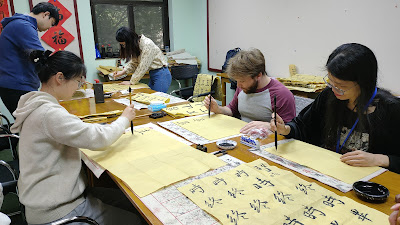HNC Life on Campus--Extra-Curricular Interest Group Classes
With more and more international students back on campus and Chinese students coming back after the Spring Festival holiday, the HNC has been getting livelier day by day. A highlight of the semester for many students has been the interest group classes organized for students to learn erhu 二胡, ping-pong and calligraphy. Students reflect on what they have learned in these classes, and the sense of community they create.
For the Spring semester, the HNC has invited some teachers to offer interest courses in calligraphy, erhu and ping-pong. With a steady flow of international and Chinese students arriving at the Center, on-campus students have the opportunity to spend more time together and learn a new skill. The interest group classes are a great way to make new friends, take a break from studying, and engage more with Chinese culture. Joe Baldock (MAIS’ 2023), Yu Jie 郁杰 (Certificate’ 2023), Chris Hankin (MAIS’ 2024) and Sophia Pradels (MAIS’ 2024) reflect on the classes they are taking.
 |
| HNC students in Fall 2022 learning to play the erhu |
Yu Jie: The erhu class is an ideal place to unwind after a hard week’s work and experience the joy of creating something. The erhu is a very interesting instrument, because even for the most difficult technique, you have to relax both mentally and physically before you can master it. If you get stressed and your muscles stiffen up, you will not be able to master the technique. You almost have to picture an erhu master telling their students, "to play well, it has to feel like you are not the one playing the instrument--let the music flow through you!" In the future, I hope to learn the cello transcription of BWV 564: Adagio. I consider it the saddest but most beautiful piece by Bach, and I hope one day I can play it myself and actually feel the music on an instrument. I think the erhu’s temperament fits that piece, which is why I picked erhu in the first place!
Chris Hankin: I decided to sign up for the ping-pong classes to know my classmates better, and because it is a very special sport. People of all ages can be really good at ping-pong, and many people at the center play it. You will often see professors that are past retirement age and can still beat me very easily. You can play ping pong for so long, compared to other sports, which is another reason I want to improve my skill. Through these classes I learned how important technique is for ping-pong. It may seem obvious, but in the US when we play it’s more just for fun, and they hit the ball in any way that feels natural. In contrast, the coach early on gave us specific instructions for the form in a forehand versus backhand for example. Technique is also crucial in ping-pong, because you cannot make up for it with athleticism for example, like you could do in soccer if you’re fast or strong. Physicality is a much smaller part of the game in ping-pong.
 |
| HNC students face off in a ping-pong match |
In the future I hope to keep playing against different opponents. There are so many people at the center who are really talented, such as Co-director Cong Cong and Professor Zhang 张老师 who works at the front desk. The thing that’s very special about sports especially in an international context is that they are a vehicle to get to know people.
An important tip I would give to beginner players is to make sure you keep your shoulder, elbow, and wrist in a fixed position instead of swinging your arm and rotating your waist to hit the ball. Even though it feels natural to swing your arm to hit the ball, the instructor taught us early on that by keeping your arm fixed, you get a much more controlled shot. This allows you to consistently return the ball, and as you progress, it allows you to hit more powerful shots without sacrificing accuracy and control.
 |
| The author's calligraphy class |
Written by Sophia Pradels, MAIS 2024


